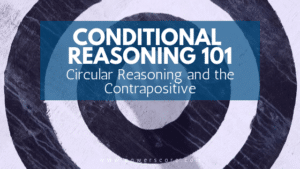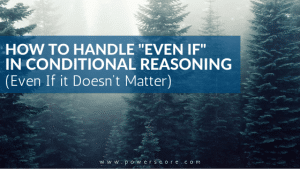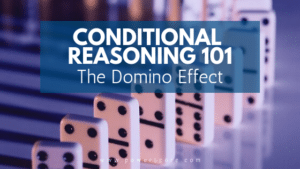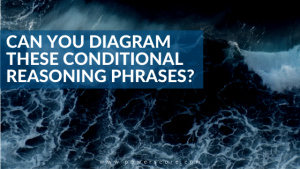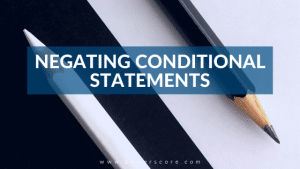Students often ask great questions on our LSAT Forum.One that specifically sticks out regards the existence of circular reasoning in a question that appeared to use the contrapositive. From appearances, the question did use the contrapositive but the reasoning was still flawed, precisely because of the way it was used. Because so many become used to the contrapositive and eventually take it for granted, questions that trade on the point … [Read more...]
The Most Dangerous Conditional Rule on the LSAT
On our LSAT Discussion Forum recently, I've been running into a recurrent question about a conditional reasoning rule. These questions revolve around a really tricky phrasing, one that has devastated test takers when it has appeared on previous LSATs. But if you can learn the idea, it takes something the test makers expect to be very difficult and turns it into something fairly easy. Plus, it's not that tough to learn! So what is this mysterious … [Read more...]
How to Handle “Even If” in Conditional Reasoning (Even If it Doesn’t Matter)
Most students confront conditional reasoning very early on in their LSAT preparation. They spend hours mastering the logic of conditional rules in Logical Reasoning stimuli and answer choices, and in Logic Games as well. To this end, students must memorize a number of common conditional reasoning keywords and phrases that help indicate the presence of this logic.Some of these indicators become incredibly obvious with practice. Many of us can … [Read more...]
Conditional Reasoning 101: The Domino Effect
In a previous blog post, I talk about the basics of conditional reasoning on the LSAT. It deals with fairly simple statements involving a single sufficient condition and a single necessary condition. Though, on the LSAT, things are not always that simple! Sometimes, you will encounter conditional chains. This is where one thing is sufficient for another, which is sufficient for a third, which is sufficient for a fourth. Stringing these … [Read more...]
Conditional Reasoning 101: As Easy as Falling Off a Log
Conditional reasoning is argumentation based on “if…then” statements and it is a prominent feature of the LSAT. While the numbers vary from test to test, year to year, you can expect around 10 questions in a single LR section that involve conditional reasoning. You’ll also see that at least half of the Logic Games will employ it as well. Some games will be entirely conditional, with every single rule setting up an if/then statement. For example, … [Read more...]
Can You Diagram These Conditional Reasoning Phrases?
Conditional reasoning appears throughout the LSAT, in the arguments presented within the Logical Reasoning sections of the test, in the grouping games that are featured in every Logic Games section, and even (to a lesser extent) in the Reading Comprehension section of the test. This type of logic classifies conditions as Sufficient or Necessary, depending on whether they are sufficient to glean further information, or necessary for something else … [Read more...]
Negating Compound and Conditional Statements
The ability to logically negate a statement—whether conditional, causal, etc.—is critical to your success on the LSAT. It comes up most commonly in the Logical Reasoning section of the test, although any question stem using the word “EXCEPT” (always capitalized) will require you to logically negate that stem.The list does not stop here. Every time you apply the contrapositive of a conditional statement, you will need to reverse and negate the … [Read more...]
Conditional Reasoning Practice: Test Your Skills
The other day I came across an apparently famous logic puzzle called The Wason Selection Task. I say "apparently" famous because I for one had never heard of it. But I was instantly struck by the conditional nature of the process in question. If you're reading this I presume you've got some experience with LSAT conditionality. If you'd like more I've included a number of helpful links at the end of this post! Test Your Knowledge Take a look at … [Read more...]
Cannot Be True Questions and Conditional Reasoning
Cannot Be True questions in Logical Reasoning occasionally feature conditional reasoning (reasoning that uses sufficient and necessary conditions). Some of those questions can appear to be extremely difficult.As today's LSAT Forum Post of the Day shows, these questions often revolve around the same error. The test makers just dress it up a bit differently each time in order to throw off unsuspecting test takers. PowerScore LSAT Logical … [Read more...]
Beware of Keywords in Logical Reasoning Questions
Bad advice appears well-justified and initially quite useful in solving a good number of questions. Unfortunately, shortcuts are easy to circumvent. What's worse, they can be used as traps—especially if you tend to use them blindly (as people often do). Let’s take a look at a common belief about Flaw in the Reasoning questions: If you come across a Flaw question where the stimulus contains conditional reasoning, the flaw has something to do with … [Read more...]
Negating Conditional Statements
Most Logical Reasoning questions with conditional reasoning won’t require you to negate the conditional relationships in them. You will certainly need to know what the contrapositive is, and—if there are multiple conditional relationships—you need to know how to form a conclusion by combining them into a chain (aka the “law of syllogism”). Occasionally, in Justify questions, you will need to establish a logical link between the premises and the … [Read more...]
Find Success within the 4 Corners of the “Must Be True” Stimulus
Often, people studying for the LSAT have trouble figuring out how the test has anything to do with real life, let alone law school or the practice of law. But the connection is clear with Must Be True questions. It all comes down to the "four corners" rule. The Four Corners Rule In Must Be True questions, you're limited to the information in the stimulus. You can't bring in any outside information. So, the correct answer choice will be either … [Read more...]
Conditional Reasoning Redux: The Only Cheat Sheet You Need on the LSAT
First, a disclaimer. You cannot have a cheat sheet when taking the LSAT. Don't even think about it. But, if you follow the advice below, you wouldn't need to. This cheat sheet is for those of you who struggle with the myriad of ways in which the LSAT conveys conditional relationships. We feel your pain! It sucks encountering 20 different ways of saying the same thing. Then again, that's what makes natural language different from coding. A Word … [Read more...]
Beyond “Unless”: Advanced Conditional Reasoning
It's fair to say that conditional reasoning is either the bane of your test prep, or a welcome escape from the uncertainty that plagues causal reasoning. In the first few months of test prep, you will likely see conditional reasoning everywhere: understanding conditional reasoning can easily turn into an obsession, prompting you to diagram whenever you come across any of the indicators of conditionality. The costs of this approach ultimately … [Read more...]

